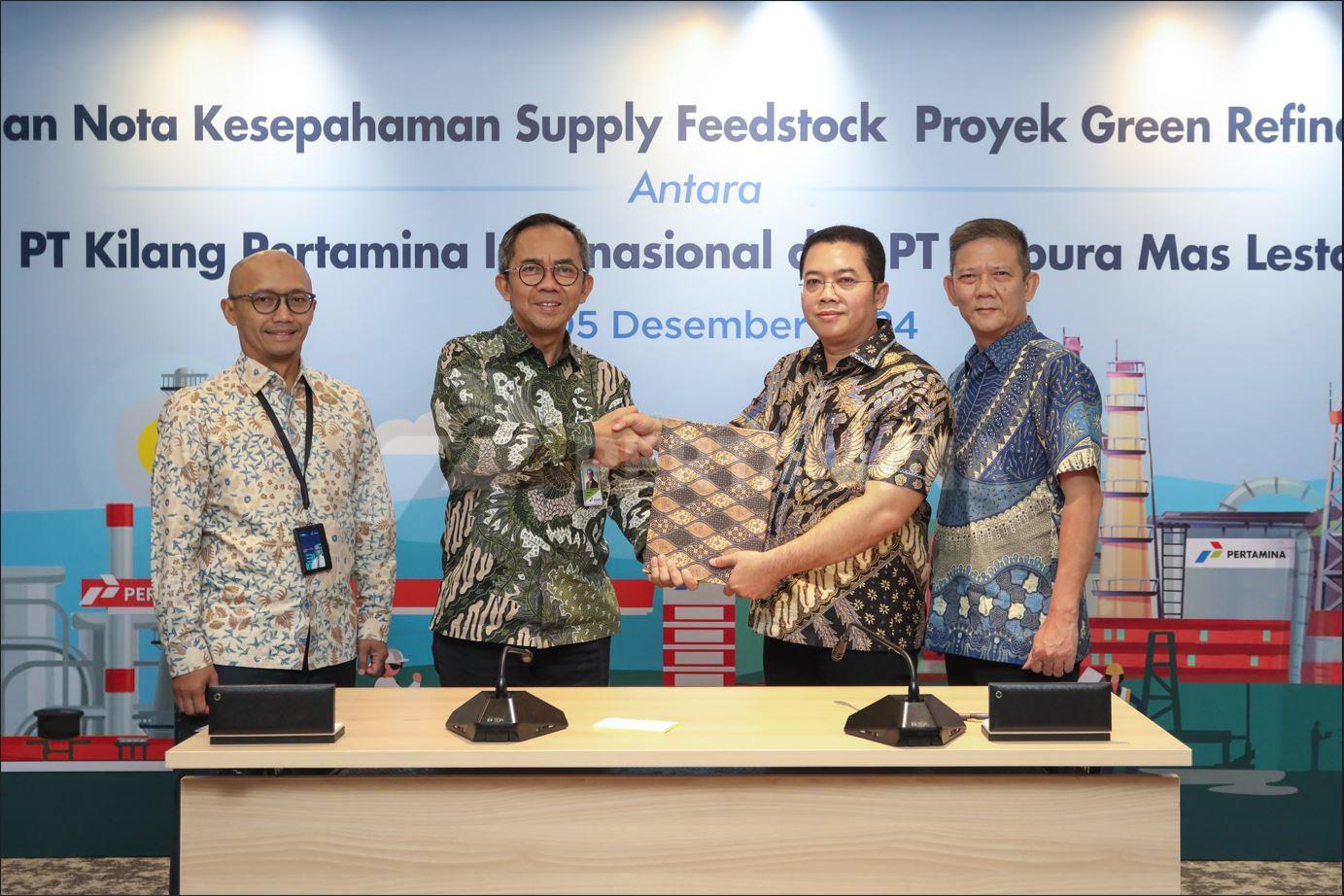
Strengthening Sustainability Commitment, Kilang Pertamina Internasional Ready to Process Used Cooking Oil
Jakarta, December 17, 2024 – PT Kilang Pertamina Internasional (KPI) continues to advance its efforts to produce environmentally friendly fuel products. It was marked by signing the Memorandum of Understanding (MoU) on Feedstock Green Refinery Cilacap Project at the Cilacap Refinery. The agreement was signed by the President Director of KPI, Taufik Aditiyawarman, and the President Director of PT Gapura Mas Lestari (GML), Heru Fidiyanto, earlier this December. This initiative represents a crucial and strategic step for KPI in developing the green fuel business in Indonesia.
The Green Refinery Cilacap project plans to process Used Cooking Oil (UCO) feedstock with a capacity of 6,000 barrels per day, producing Hydrotreated Vegetable Oil (HVO) and Sustainable Aviation Fuel (SAF), with an estimated total output of approximately 300,000 kiloliters per year.
The Cilacap Refinery is already capable of producing HVO and SAF. HVO is processed from Refined Bleached Deodorized Palm Oil (RBDPO), branded as Pertamina Renewable Diesel (RD), derived 100% from vegetable oils. Meanwhile, 2.4% of SAF is from Refined Bleached Deodorized Palm Kernel Oil (RBDPKO) sourced from palm kernel oil. The HVO product will be a blending component in diesel fuel, offering superior quality compared to FAME biodiesel. It is designed to meet the highest standards required in four-season countries, targeting markets in Europe and the Americas.
Additionally, the SAF product from the Cilacap Green Refinery is expected to support the supply for SAF implementation in the aviation industry, aligning with the National Roadmap and Action Plan for Sustainable Aviation Fuel Development.
Taufik Aditiyawarman emphasized KPI's commitment to sustainability and energy innovation. “This Green Refinery project is not just about providing alternative energy sources but also creating added value for society, supporting local growth, and reducing environmental impact,” Taufik stated.
He further emphasized that with collaboration and commitment from all stakeholders, the project could overcome challenges and become a success story in sustainable energy development. “Let us work together to create a better future for our nation,” he urged.
The Green Refinery Project significantly contributes to sustainability efforts, particularly in addressing climate change (SDG 7 and 13). By converting UCO into eco-friendly fuels, the project not only provides renewable energy sources but also plays a vital role in reducing greenhouse gas emissions and air pollution.
The Green Refinery initiative in Cilacap reflects Indonesia’s commitment to a cleaner energy transition while maintaining ecosystem balance for a sustainable future. The signing of the MoU marks an important milestone in strengthening collaboration between public and private sectors to achieve sustainability-driven energy goals in Indonesia.
PT GML is one of Indonesia’s leading UCO collection and export companies, with over 20 years of experience.
“The collaboration between KPI and PT GML, leveraging their expertise in the supply chain from collection to feedstock supply, is expected to support and ensure feedstock availability for the Cilacap Green Refinery Project,” Taufik added.
Similarly, the Vice President of Corporate Communication of PT Pertamina (Persero), Fadjar Djoko Santoso, stated that Pertamina continues to develop renewable energy by utilizing domestic resources.
“One of our innovations includes processing used cooking oil at Pertamina’s refineries, which enables us to produce more sustainable and efficient fuels,” Fadjar emphasized.
KPI, a subsidiary of Pertamina, operates in the oil refining and petrochemical business in adherence to ESG (Environmental, Social & Governance) principles. As a participant in the United Nations Global Compact (UNGC), KPI is committed to implementing the UNGC’s Ten Universal Principles in its operational strategies as part of its ESG framework. KPI will continue to operate professionally to achieve its vision of becoming a world-class oil refinery and petrochemical company that is environmentally conscious, socially responsible, and adheres to good corporate governance practices.**